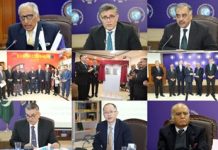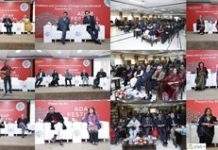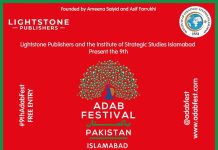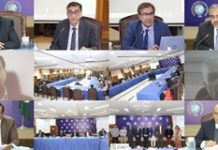Press Release
Islamabad Conclave 2021
Working Session II on “Strategic Stability in South Asia”
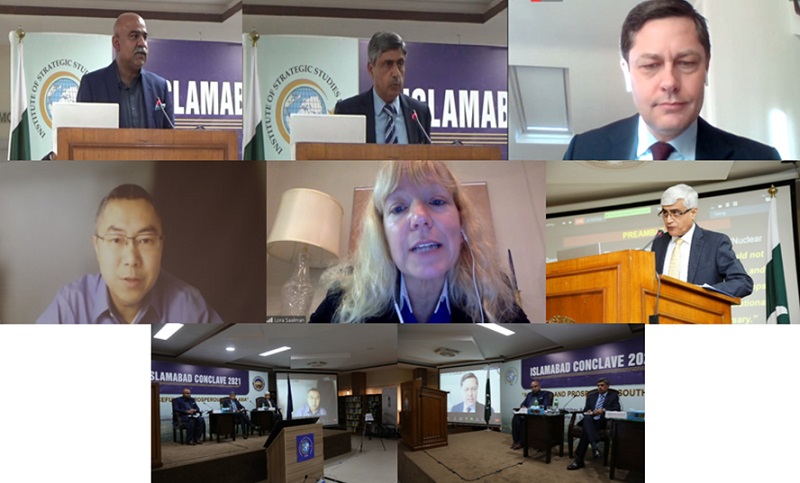
The Institute of Strategic Studies Islamabad (ISSI) organised Islamabad Conclave-2021 on the theme “A Peaceful and Prosperous South Asia,” on December 9-10, 2021. The Islamabad Conclave is the annual mega event of the Institute which was organised by its five Centres of Excellence. The Inaugural Session was graced by ISSI patron, Foreign Minister of Pakistan Makhdoom Shah Mahmood Qureshi. The Keynote Address was given by Honourable Mr Imran Khan, the Prime Minister of the Islamic Republic of Pakistan. Ambassador Aizaz Ahmad Chaudhry, Director General ISSI, shared the work and vision of the ISSI and Islamabad Conclave 2021 with the honourable guests and participants.
The Arms Control and Disarmament Centre (ACDC) at the Institute hosted the Working Session-II on “Strategic Stability in South Asia” on December 9, 2021.In his introductory remarks, Malik Qasim Mustafa, Director ACDC, said that strategic stability in South Asia is under stress as new security challenges have emerged from India’s actions and behaviour. It is modernising its nuclear weapons programme and shifting its focus on a nuclear warfighting doctrine, as well as introducing technologies like hypersonic missiles in the region that are further destabilising South Asia.
The keynote speaker was Lt General (Retd) Mazhar Jamil, former DG SPD/Advisor National Command Authority (NCA), Pakistan, said that there are many elements that affect strategic stability in South Asia including dynamics of political instability and strategic trilemma. He emphasised that strategic stability cannot be achieved through the Cold War mentality and pursuit of risky doctrines like the Cold Start. He said that the onus to achieve strategic stability always falls on Pakistan. He asserted that Pakistan will have to maintain deterrence stability while trying to pursue dispute resolution and conflict resolution. It is time for India to act as a responsible nuclear state and exercise restraint.
Dr Walter C Ladwig III, Associate Professor in International Relations at King’s College London, spoke on “Nuclear Doctrinal Shifts and Force Postures in South Asia.” He said that nuclear architecture is very complicated in South Asia since there are two nuclear dyads – India and China, and India and Pakistan. China’s build-up affects India, and the Indian nuclear advancement affects Pakistan in turn. He said that tactical nuclear weapons, ambiguous nuclear red lines, shaky commitment to No First Use, dual-use missiles paint a pessimistic outlook for strategic stability in South Asia.
Mr Li Chijiang, Vice President and Secretary-General, China Arms Control and Disarmament Association (CACDA), China, spoke on “Strategic Stability in South Asia: A Chinese Perspective.” Strategic Stability is linked to relations between the three main countries China, Pakistan and India. There is a strategic imbalance between India and Pakistan. Pakistan security concerns should be addressed. There is a need to promote confidence-building measures (CBMs) to promote Strategic Stability. Dialogue on emerging technologies and crisis management is important.
Dr Lora Saalman, Associate Senior Fellow, Stockholm International Peace Research Institute (SIPRI) spoke on “Toward Strategic Stability: Nuclear Challenges and CBMs in South Asia.” She said that nuclear transparency and CBMs in South Asia have a lengthy but fraught history that has contributed to ‘CBM fatigue.’ SIPRI has made efforts to reinvigorate CBMs through engaging a diverse group of military, nuclear, political and regional experts from China, India, Pakistan, Russia and the US and to expand the range of CBM options such as India and China nuclear dialogue, India and Pakistan agreement on notification of nuclear accidents at sea, multilateral dialogues on arms control in outer space, India-Pakistan-China nuclear dialogues, and declarations on de-mated and de-alerted status of nuclear weapons.
Major General (Retd) Ausaf Ali, Advisor, SPD, Pakistan spoke on “Emerging Technologies & their Impact on Nuclear Deterrence in South Asia.” He said that India has embarked upon acquiring and imbibing new emerging technologies like hypersonic missiles, artificial intelligence, directed energy weapons, and Anti Satellite (ASAT) capability. The introduction of innovative technologies will directly as well as indirectly impact strategic deterrence in South Asia encouraging arms races and escalation dominance. South Asia is likely to remain a nuclear flashpoint. A constant review is, therefore, indispensable to ensure sustained credibility of nuclear deterrence and maintain peace in the region.
The session was followed by a robust question and answer session.




